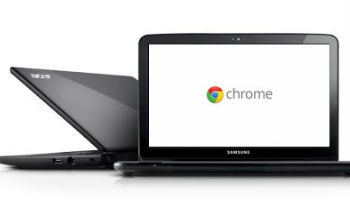HP, Acer To Boost Chromebooks After ‘Disappointing’ Windows 8

HP and Acer are reportedly looking to increase their Chrome OS laptop push after slow Windows 8 sales
Microsoft is facing more potential headaches regarding the sluggish uptake of the Windows 8 operating system.
This is because it was reported that both Hewlett-Packard and Acer are looking to market more Chrome OS laptops, rather than Windows 8, which they say have had disappointing sales.
Chromebook Push
HP is about to launch its first-ever Chromebook in February, according to a 28 January report by The Verge.
The information came from a leaked specifications sheet that was found on HP’s Website, according to the story. The spec sheet has since disappeared from the site.
 Meanwhile, Acer’s President Jim Wong told Bloomberg News that his company’s Chromebook sales are doing well while sales of machines running Windows 8 are dropping, according to a 27 January story.
Meanwhile, Acer’s President Jim Wong told Bloomberg News that his company’s Chromebook sales are doing well while sales of machines running Windows 8 are dropping, according to a 27 January story.
Sales of the Chrome-based machines accounted for 5 percent to 10 percent of Acer’s US shipments since being released in November 2012, Wong told Bloomberg. “That ratio is expected to be sustainable in the long term and the company is considering offering Chrome models in other developed markets,” according to the report.
The growth of the Chrome OS sales and the disappointing Windows 8 sales is causing Acer to look at new strategies, the article said. Across the industry, sales of traditional Windows desktop and laptop computers have been declining for some time as tablets and smartphones are attracting new users and sales, effectively replacing Windows machines in many case.
Those realities are seen in recent global PC shipment figures, which dropped 6.4 percent in the fourth quarter of 2012, to 89.8 million units, compared with one year ago, according to new figures released by IDC in January.
Microsoft launched its new Windows 8 operating system late last October and computer makers have been hoping for a boom in sales.
“Windows 8 itself is still not successful,” Wong told Bloomberg. “The whole market didn’t come back to growth after the Windows 8 launch; that’s a simple way to judge if it is successful or not.”
Market Implications
The coming new HP Pavilion Chromebook will include a 1.1GHz Intel Celeron processor, 2GB of RAM, a 16GB solid-state drive, and a 14-inch, 1366 by 768 display, according to The Verge. That display would be larger than similar displays on competing Chromebook devices, which are typically 11.6 inches.
“HP is officially offering no comment on the device yet, but the document also noted an ‘ad embargo date’ of 17 Febuary,” according to The Verge, meaning that more details about the devices could come around that time.
Charles King, principal analyst with Pund-IT, said the reports offer the latest cracks in what has in the past been seen as the unbreakable facade in the Windows on Intel marketplace.
“It does have some interesting implications in what’s going on,” King told eWEEK. “The market for computers is changing. It’s an indication that rather than being simply ‘bilingual’ in their IT usage patterns, that consumers and employees of businesses are now more ‘multi-lingual’ with their devices.”
That means that people aren’t just using Windows machines or a single smartphone, but are also using Apple machines and tablets and mingling Android phone use with iPhones and more, said King.
“They’ll use a Windows PC or laptop at work, but they have a Mac at home,” he said. “So the old barriers between Windows and Mac have broken down.”
Product Mix
The same things have also been happening on the data centre side, according to King, as companies moved from Unix and mainframes to servers with commodity x86-based hardware. “And now we see these new ARM-based servers that people are talking about that are going to be a bigger part of the market in the next year or two.”
Ultimately, consumers’ and businesspeople’s new use patterns are driving the changing market for companies like HP and Acer, said King.
“Vendors go where the money is,” he said. “You’ve got to be able to make a profit. We’re seeing it here at Acer and HP. Microsoft’s unassailable position on the desktop may not be as unassailable anymore. Here, these comps are exploring [alternatives] and then seeing if there is enough demand for it to make the business work.”
Chromebooks and their desktop brethren Chromeboxes run Google’s Chrome operating system and feature a wide range of pre-installed, cloud-based Google services and products, including Google Docs and Google Calendar.
Google and its partner vendors who have built Chromebooks so far, including Samsung and Asus, have been pushing Chromebooks as Internet-connected devices that can be cheaper, faster and more nimble than traditional laptops and notebooks. Chromebooks allow users to do their work online with less need for on-machine storage for large applications and files. One shortcoming, though, is that users need good connectivity to use their machines, and offline work can be a challenge, according to critics and reviewers.
At the same time, the machines can be inexpensive and well-featured devices that allow users to accomplish a wide range of tasks without the bloat and mass of a traditional laptop or notebook machine.
Consumers, however, haven’t been jumping aboard the Chromebook bandwagon in huge numbers, based on sales so far. In fact, several systems makers have released Chromebooks in the last year and they haven’t stuck with consumers, causing some vendors to retreat or try again with new machines that offer expanded features.
Are you a Google expert? Take our quiz!
Originally published on eWeek.